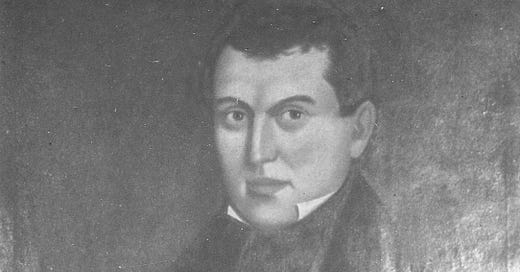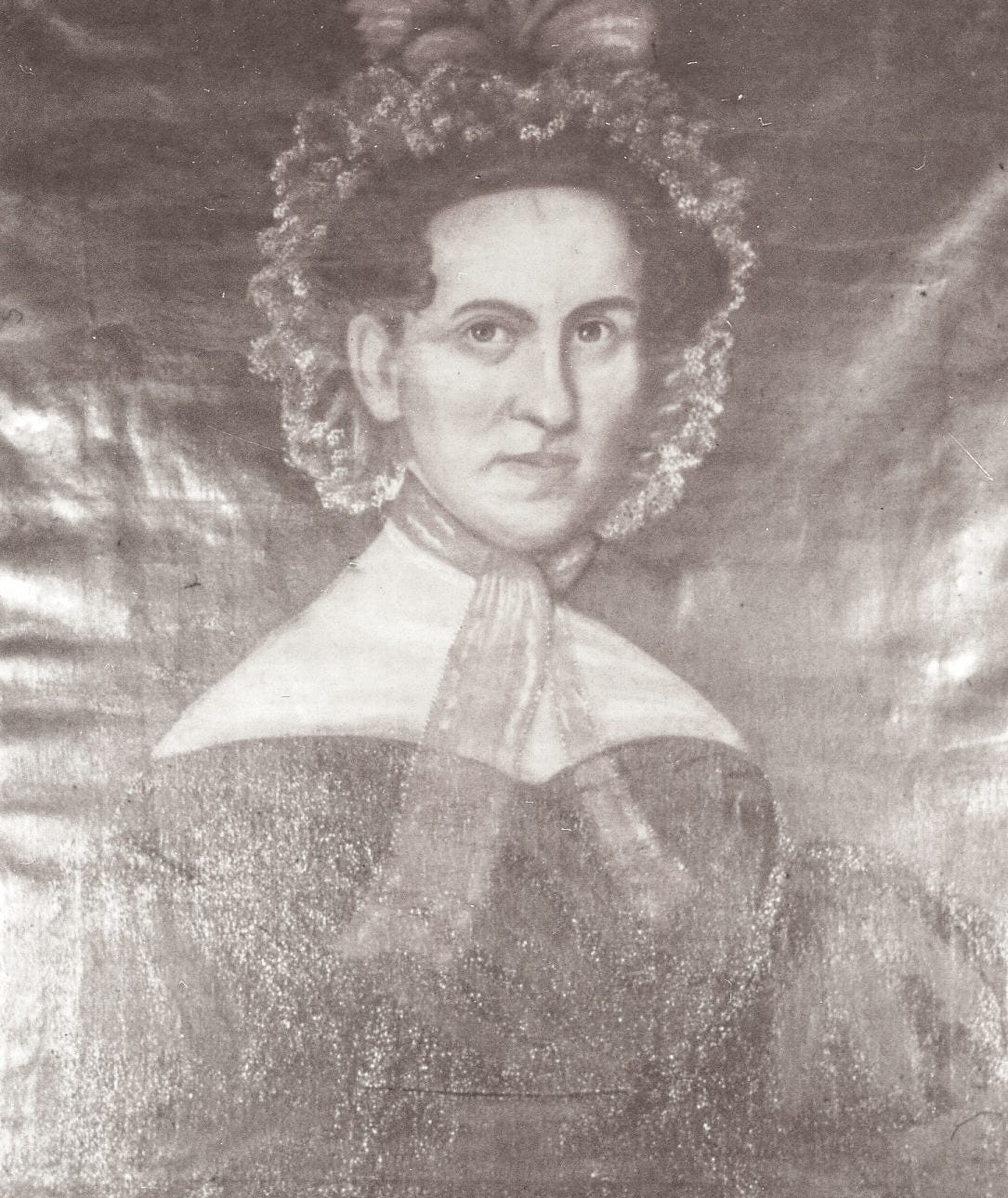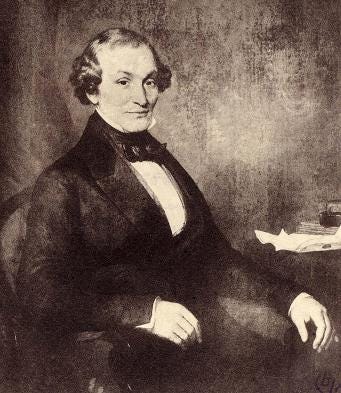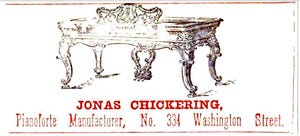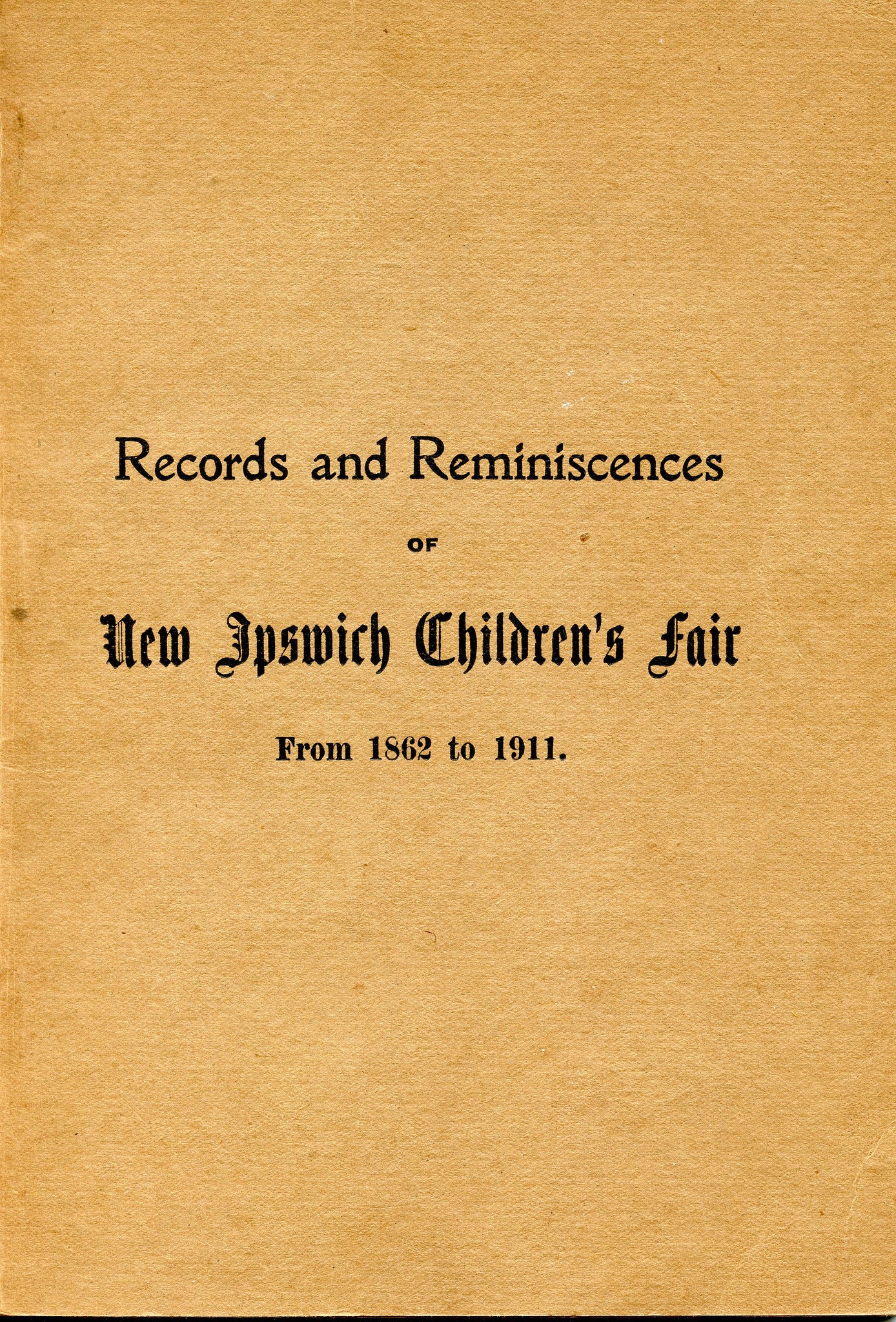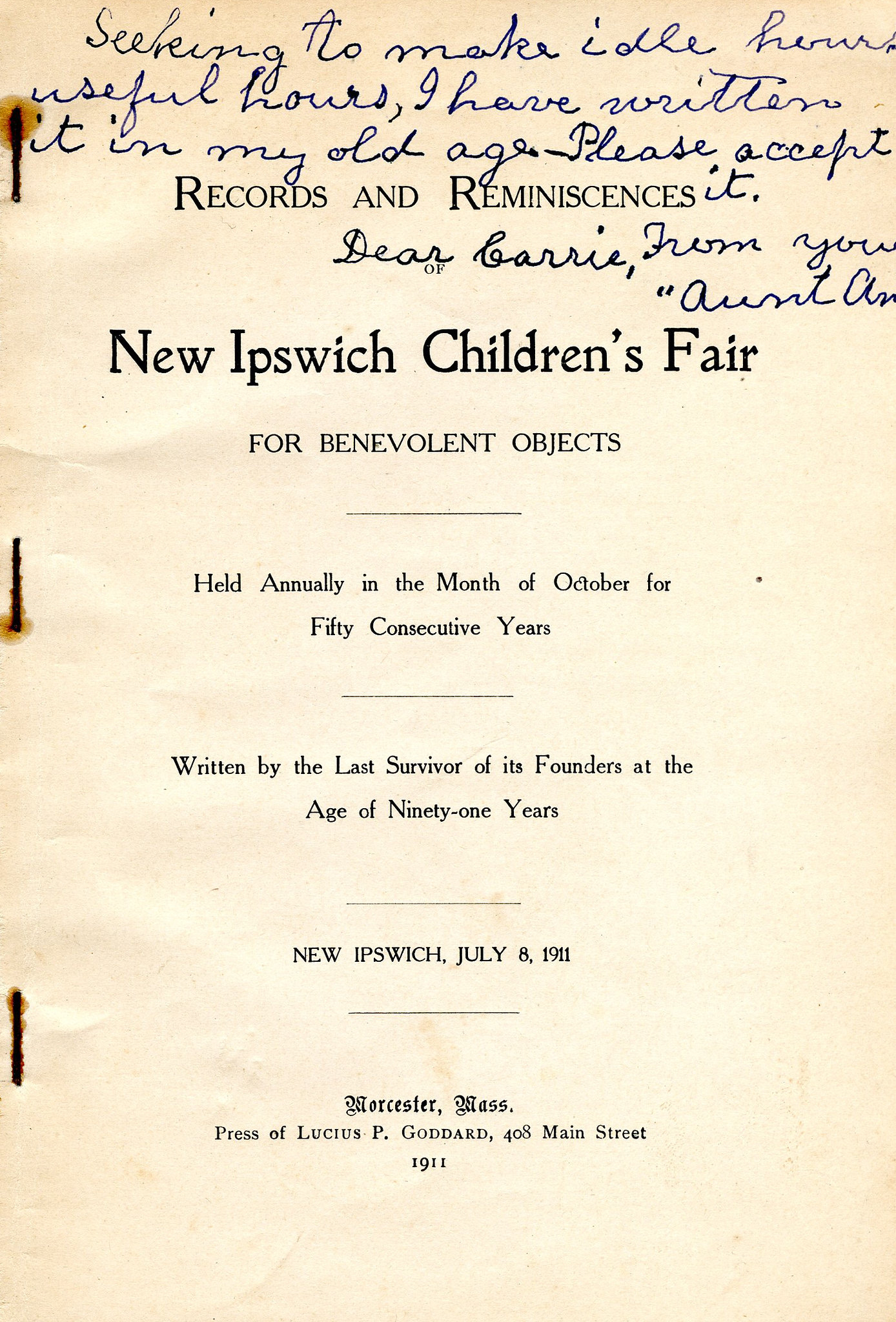Portraits
Charles Chickering (1825-1903), son of Samuel and Julia Boutelle, was born in New Ipswich, New Hampshire. He married Harriett Diana Kenny (1840-1923), daughter of Jabez Kenny and Idella, in 1859 in Denmark, Iowa. They had nine children.
Jonas Chickering (Piano Maker)
Wikipedia Entry
Jonas Chickering (April 5, 1798 – December 8, 1853) was a piano manufacturer in Boston, Massachusetts.
Jonas Chickering was born in Mason Village, and raised in nearby New Ipswich, New Hampshire where his father Abner Chickering kept a farm and worked as a blacksmith. Chickering apprenticed three years as a cabinet maker with John Gould.
In 1818 Chickering removed to Boston with Gould's permission, working for cabinet-maker James Baker, but one year later began working for pianomaker John Osborn at 12 Orange Street. In 1823, Chickering formed a partnership with pianomaker James Stewart; they produced 15 pianos the first year at workshops at 20 Common street and sold their first piano on June 23, 1823 for $275.
Stewart & Chickering dissolved after four years, and in 1830 Chickering became associated with John Mackay, a merchant, as well as organ and pianomaker who had worked with Alpheus Babcock, doing business as Chickering & Co. at 416 Washington street. In 1837 Chickering & Mackays (with Mackay's son William H. Mackay) built a new five story factory, with warerooms and a small concert hall, at 334 Washington Street, and warehouse at Franklin square.
John Mackay was lost at sea February 1841, and Chickering mortgaged the factory and bought out his and William H. Mackay's shares in installments. The Washington street factory burned December 1, 1852 putting out over 200 workmen and amounting to $250,000 loss, as well as all the tools and patterns, and a nearly completed prototype for a grand piano (later indicated as being overstrung). Chickering organized a temporary factory, and began construction of a new steam-powered factory started at 791 Tremont street, designed by Edward Payson to Chickering's specifications.
Chickering died before the factory's completion, on December 8, 1853. Over 800 people, including leading piano manufacturers and many of the societies of which Chickering had been a member, marched in his funeral procession and the mayor of Boston ordered the ringing of the city's church bells.
1853 advertisement
At the time of his death, Chickering's company had built over 12,000 pianos and was producing about 1,500 a year worth $200,000, almost twice the sales of Timothy Gilbert, his largest competitor in Boston. His pianos at the London International Exhibition of 1851 earned a gold medal with special mention for the grand, which was noted for brilliancy and power as well as its great solidity. Chickering patented single piece iron frames combined with wrest plank bridges and damper guides in square pianos, and with massive wrest plank terminations in grands; Chickering & Mackays were assignees of an action patented by Alpheus Babcock, and licensed actions patented by Edwin Brown and George Howe. Chickering pioneered pronounced curved hammer strike lines in squares which permitted larger hammers, and is also credited encouraging Ichabod Washburn to develop the first music wire produced in the United States.
Chickering, with Henry W. Pickering and Edward Frothingborn incorporated a charter to erect the Boston Music Hall, paid for by subscription and built in 1852. He served as president of the Handel and Haydn Society, and of the Massachusetts Charitable Mechanic Association, which he joined in 1829, until his death.
Chickering married Elizabeth Sumner Harraden November 20, 1823. They had four children: Thomas E. Chickering, C. Frank Chickering, George H. Chickering, and Anna Chickering. Chickering's sons worked as pianomakers, and became partners in the company in 1853 forming Chickering and Sons.
On this day - July 9, 1908
James Roger diary entry
9th (Thursday)
Warm and sunny, wind E. to W. David and men cutting in meadow in morning and brought in two good loads of the little field. I tossed hay in morning and finished cutting lots. Fixed Hall for Grange tonight.
On this day - July 9, 1897
William Jurian Kaula diary - no entry
Records and Reminiscences of the New Ipswich Children's Fair (1862 to 1911)
Dedication and Introduction
DEDICATION
I inscribe this little unstudied Work to my two great grand-daughters-one my namesake-in Mississippi.
New Ipswich, the town of our love, and our pride, has made no mean record among the towns which make our own New England from 1740 or 1750 to the present time.
Her location as a colony from the "Bay State or Massachusetts Colony" was an unrivaled one.
Among the foot-hills, where the more level half of eastern Massachusetts begins to climb towards the White Mountains of the northern part of New Hampshire (not yet granted by the King of England to Mason and Gorges), the settlers from Ipswich, Concord, etc., coming up through Ashby, found the Souhegan and its tributary brooks, affording desirable water privileges, and for locating fertile farms aud pleasant villages that would overlook beautiful scenery. These settlers were of the old Pilgrim stock; sturdy, conscientious, irreproachable; with high aims and lofty purposes.
They early established the "Church and the School-house." They freely gave themselves to the resistance of tyranny, with the neighboring colonies. They formed a Christian Church. They established a High-school of learning. They took position as opponents of human slavery and slavery to the "Drink Habit."
It has been easier for their descendants to send the "Iowa Band" to help the New West become another New England; or teachers to the Southern slaves; or missionaries to the heathen-world; or soldiers to resist disunion and extension of slavery, when we were forced into the war of the rebellion, than for towns which had a different ancestry.
This is the reason that, with so decreased a population, there is still continuation of worthy institutions among us. This accounts for the ready response of our people to unitein the Annual Harvest Festival that seeks annually to send little streams out from our homes of plenty to less favored people and places, which carry to them help and blessing. ,,
Long may the "Children's Fair for Benevolent Purposes" continue to bless themselves and the world by its yearly contributions.
L. A. O.
